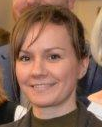Case Study: Lily Lipman RVN
Courses undertaken at The College of Animal Welfare
BSc Honours Veterinary Nursing Degree (Middlesex University 2002-2006)
 Lily Lipman RVN completed the BSc Honours Veterinary Nursing Degree programme at Middlesex University (in collaboration with the College of Animal Welfare) in 2006, and now works as a Qualifications Manager at the Royal College of Veterinary Surgeons (RCVS). We caught up with Lily and asked her about her career to date, and her advice for those looking to join the industry.
Lily Lipman RVN completed the BSc Honours Veterinary Nursing Degree programme at Middlesex University (in collaboration with the College of Animal Welfare) in 2006, and now works as a Qualifications Manager at the Royal College of Veterinary Surgeons (RCVS). We caught up with Lily and asked her about her career to date, and her advice for those looking to join the industry.
What did you do after you left College?
As soon as I graduated in 2006 I started work at the Queen Mother Hospital for Animals/Royal Veterinary College as a Medicine nurse. I was heavily involved with the diagnostics such as endoscopy and radiography, as well as aiding the clinical trials nurses with the research they were collecting evidence for. I was involved with the day to day care of in patients and day patients, and worked closely with the clinicians to promote best practice care. I was also part of the assessment team for the vet students who were on rotation, and was involved with the practical training of them on a one to one basis. I also gained my assessor qualification and began assessment of student veterinary nurses.
I then began teaching in 2008, in a large further education college in St Albans. Initially I taught animal care, then I was given the opportunity to set up and run the Level 2 Veterinary Care Assistant. After coming back from maternity leave a few years later, I was given the task of running the Level 3 Veterinary Nurse diploma. I was also module leader for four modules on a Foundation Degree in Animal Management; teaching nutrition, animal health and professional development and study skills. At the same time I completed a Masters in Business Administration around my full time job and family commitments.
I left in 2014, and took up my current post as Qualifications Manager in the Veterinary Nursing Department, at the Royal College of Veterinary Surgeons. My main role is the accreditation and re-accreditation of Higher Education Institutions and Awarding Organisations, as well as quality monitoring of all veterinary nurse training in the UK. It is a quite varied role, and involves reporting my findings to the Veterinary Nurse Education Committee, aiding working parties to do with the development of veterinary nurse training in the UK, and attending everything from UK veterinary nurse graduations to European nursing conferences.
What advice do you have for someone looking to join the industry now?
The first thing I would say is do not underestimate the impact you make, through the act of doing your every day job, on countless animals and their owners. You will see the best and worst of people and animals, and each one must be treated with the same professional consideration. Also do not underestimate the hard work and determination needed to be successful in this degree and career choice. It is one of the hardest and best things I ever did.
